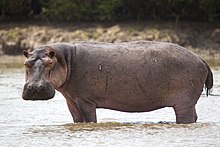
Back Seekoei Afrikaans ጉማሬ Amharic Hippopotamus amphibius AN Nicor ANG فرس النهر Arabic سيد قشطه ARZ Hippopotamus amphibius AST ГӀадияб бегемот AV Troskol (Hippopotamus amphibius) AVK Begemot Azerbaijani
| Hippopotamus Temporal range:
| |
|---|---|

| |
| A hippopotamus in Saadani National Park, Tanzania | |
| Scientific classification | |
| Domain: | Eukaryota |
| Kingdom: | Animalia |
| Phylum: | Chordata |
| Class: | Mammalia |
| Order: | Artiodactyla |
| Family: | Hippopotamidae |
| Genus: | Hippopotamus |
| Species: | H. amphibius
|
| Binomial name | |
| Hippopotamus amphibius | |

| |
| Current distribution of the hippopotamus | |
The hippopotamus (Hippopotamus amphibius) (/ˌhɪpəˈpɒtəməs/; pl.: hippopotamuses; also shortened to hippo (pl.: hippos), further qualified as the common hippopotamus, Nile hippopotamus, or river hippopotamus, is a large semiaquatic mammal native to sub-Saharan Africa. It is one of only two extant species in the family Hippopotamidae, the other being the pygmy hippopotamus (Choeropsis liberiensis or Hexaprotodon liberiensis). Its name comes from the ancient Greek for "river horse" (ἱπποπόταμος).
After elephants and rhinoceroses, the hippopotamus is the next largest land mammal. It is also the largest extant land artiodactyl. Despite their physical resemblance to pigs and other terrestrial even-toed ungulates, the closest living relatives of the hippopotamids are cetaceans (whales, dolphins, porpoises, etc.), from which they diverged about 55 million years ago. Hippos are recognisable for their barrel-shaped torsos, wide-opening mouths with large canine tusks, nearly hairless bodies, pillar-like legs, and large size: adults average 1,500 kg (3,300 lb) for bulls (males) and 1,300 kg (2,900 lb) for cows (females). Despite its stocky shape and short legs, it is capable of running 30 km/h (19 mph) over short distances.
Hippos inhabit rivers, lakes, and mangrove swamps. Territorial bulls each preside over a stretch of water and a group of five to thirty cows and calves. Mating and birth both occur in the water. During the day, hippos remain cool by staying in water or mud, emerging at dusk to graze on grasses. While hippos rest near each other in the water, grazing is a solitary activity and hippos typically do not display territorial behaviour on land. Hippos are among the most dangerous animals in the world due to their aggressive and unpredictable nature. They are threatened by habitat loss and poaching for their meat and ivory (canine teeth).
- ^ a b Lewison, R.; Pluháček, J. (2017). "Hippopotamus amphibius". IUCN Red List of Threatened Species. 2017: e.T10103A18567364. doi:10.2305/IUCN.UK.2017-2.RLTS.T10103A18567364.en. Retrieved 19 November 2021.
- ^ "ITIS on Hippopotamus amphibius". Integrated Taxonomic Information System. Archived from the original on 26 August 2014. Retrieved 29 July 2007.
